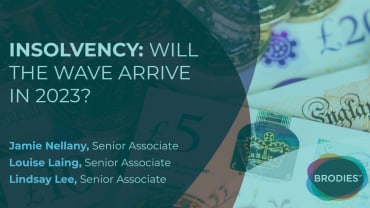The Supreme Court's ruling in favour of our client, Scottish care home provider Balhousie Holdings Ltd, sets a precedent and gives much needed clarity to those who are involved in sale and leaseback transactions where "entire interests" in land are disposed of.
In the case of Balhousie Holdings Ltd v Commissioners for Her Majesty's Revenue and Customs, the Supreme Court unanimously ruled in favour of Balhousie, agreeing that it was entitled to a zero VAT rating in relation to a transaction that involved one of its care homes.
Case background
Balhousie acquired a recently constructed care home under a zero-rated first grant from the selling developer, then financed that acquisition by a sale and leaseback of the building.
The question that came before the Courts was whether the sale and leaseback constituted a disposal by Balhousie of its entire interest in the care home, thereby triggering a self-supply VAT charge.
The question of whether VAT charges apply are outlined in the Value Added Tax Act 1994 (specifically Group 5 of Schedule 8), which provides for the zero-rating of certain supplies made in connection with the construction or conversion of buildings intended to be used for relevant residential or charitable purposes. For readily discernible public policy reasons, one of the relevant residential purposes is use as a care home.
The benefit of zero rating may, in certain circumstances be clawed back from the recipient of the zero-rated supply or supplies (called “P” in the legislation) if either of two stated events occur within 10 years from the completion of the building (the relevant period).
These are:
- if P has, since the beginning of the relevant period, disposed of its entire interest in the building; or
- if there is a change in use of the building from a qualifying to a non-qualifying use.
The occurrence of either of these events triggers what is called a “self-supply” charge to VAT, which is payable by P.
The ruling
The opinion of the Supreme Court was delivered by Lord Briggs with whom Lord Hodge, Lord Sales and Lord Carloway agreed. Lady Arden provided additional reasoning as to why the appeal should be dismissed.
As there had been no change in use of the property, the key issue became whether a self-supply trigger event had occurred in Balhousie's sale and leaseback of the property.
Lord Briggs commented in relation to whether there had been a disposal:
"…I consider that it has nothing at all to do with whether P has retained sufficient control to prevent a change of use. Rather it is concerned with avoiding conferring the large tax benefit of zero-rating upon a person who is not prepared to commit to the project of creating and operating a building for a specified socially desirable residential use for a substantial period of time after its completion. …. “entire” means exactly what it says, namely that P no longer has any interest in the premises."
The Court also confirmed that the sale and the lease were two simultaneous transactions, one disposal by Balhousie followed by an acquisition. Each of these transactions involved the transfer of much more than de minimis interest in the whole of the care home. Each was a transfer of a major interest. The Court commented that:
"All that mattered was that… the two transactions were simultaneous (or in their language “contemporaneous”) in their effect, leaving no realistic room for a scintilla temporis."
Having considered the position, the Court concluded that Balhousie did not, through the sale and leaseback of the home, dispose of its entire interest – and should be entitled to the zero VAT rating.
Significance of Balhousie ruling for other businesses
We expect this case to have a major impact on the use of sale and leaseback structures, providing clarity that such vehicles can retain a zero rating for VAT, if appropriately structured. This extends not just to the care home sector, but also to other businesses that engage in property transactions for the purposes of residential or charitable use. The Court's reasoning on what constitutes an "entire interest" will assist business and practitioners who are navigating their way through transactions and assessing whether there will be a charge to tax.
Contributor
Partner







![Court provides guidance on when a bankrupt "informed" her trustee of her interest in property - Mehers (as Trustee in Bankruptcy of Scherzade Khilji) v Khilji [2023] EWHC 298 (Ch)](https://res.cloudinary.com/brodies-com/image/fetch/f_auto,q_auto/w_370,h_208,c_fill,g_auto/e_colorize:40,co_rgb:0071AC/https://brodies.com//assets/uploads/images/blog%20images/personal-law-will-2.jpg)




